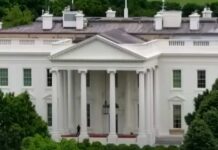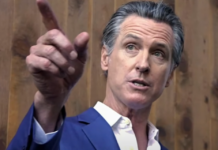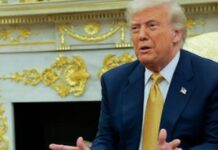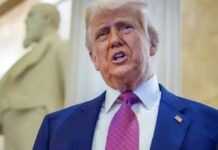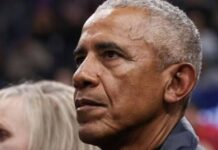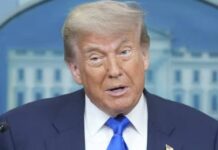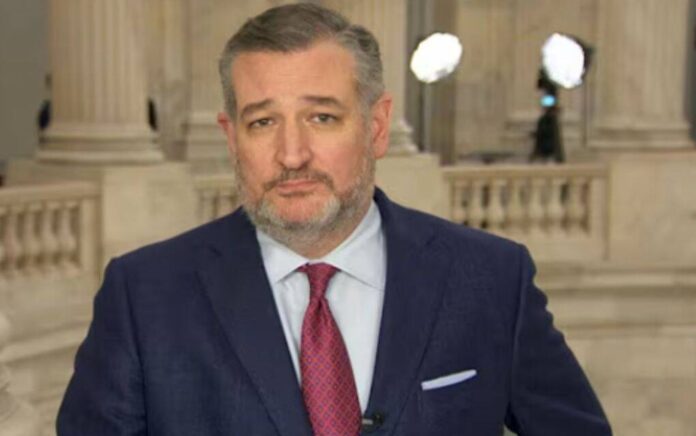
Washington, D.C. has always been full of slimy suits. That’s never going to change.
And now a U.S. Senator’s just stabbed President Trump in the back in a behind closed doors meeting.
U.S. Senator Cruz Trying To Champion Free Markets While Backing Trump’s Trade Gambit
In a glitzy ballroom at the Hilton Dallas Lincoln Centre, U.S. Senator Ted Cruz recently stood before a crowd of conservative heavyweights to accept the prestigious Sir Antony Fisher Award. Named after the British free-market trailblazer, the award celebrated Cruz’s unwavering commitment to economic liberty. The John Goodman Institute’s Annual Dinner, where the ceremony took place, drew a who’s-who of serious-minded conservatives eager to tackle pressing issues like healthcare access, deficit reduction, and keeping America’s economic engine roaring. Yet, one topic conspicuously absent from the dinner table chatter was President Donald Trump’s escalating tariff strategy—a policy that could make or break the very principles Cruz champions.
The event was a testament to Cruz’s stature as a free-market warrior, but it also cast a spotlight on the delicate dance he’s performing. As a potential 2028 presidential contender, Cruz must navigate the turbulent waters of Trump’s trade policies while maintaining his credibility as a fiscal conservative. His public statements, particularly on his widely followed podcast, reveal a man acutely aware of the high stakes—not just for the global economy, but for the Republican Party’s future. Cruz’s warnings about the potential fallout from Trump’s tariffs are a bold move, but they come with risks. Airing such concerns publicly could alienate him from the Trump faithful, a powerful bloc within the GOP.
On his podcast earlier this month, Cruz didn’t mince words about the dangers of a misstep in trade policy. “You would face a Democrat House and you might even face a Democrat Senate,” he cautioned, painting a grim picture of a “bad recession” and a “bloodbath” for Republicans if the economy tanks under Trump’s watch. These are not the words of a senator content to sit quietly on the sidelines. Cruz’s candor shows he’s willing to critique the administration’s approach, but it also puts him in a precarious position. If the economy falters, his warnings could be seen as prophetic—or worse, as disloyalty to a president whose base remains fiercely loyal.
Trump’s tariff policies have placed elected Republicans in a bind. Many, including Cruz, have adopted a cautious, wait-and-see stance, even though tariffs clash with their free-market instincts. The administration’s aggressive trade moves—25% tariffs on aluminum and steel, 25% on non-free-trade goods from Mexico and Canada, a staggering 145% on Chinese imports, and a 10% baseline on all U.S. imports—have sent shockwaves through global markets. Add to that the looming tariffs on auto parts and a 25% levy on cars, and it’s clear Trump is playing hardball. The White House insists it’s in active negotiations with trading partners, aiming to leverage these tariffs into better deals for American workers.
Cruz, ever the strategist, sees two possible paths forward. “We are facing a fork in the road,” he told me after the Goodman Dinner, his voice carrying the weight of a man who knows the consequences of choosing poorly. “There are two paths, one which is very good and one which is very bad.” The optimistic scenario, as Cruz sees it, involves Trump using tariffs as a bargaining chip to persuade trading partners to “slash tariffs against American goods and services in exchange for lowering the tariffs he’s announced.” This, Cruz believes, could be a game-changer for the U.S. economy, particularly for trade-dependent states like Texas.
“That will be a historic victory for jobs and a victory for Texas,” Cruz said, his enthusiasm tempered by pragmatism. “If we go down this path, Donald Trump could go down in history as the greatest free-trade president America has ever seen. There’s some irony in that, but you could not negotiate lower tariffs from all our trading partners without starting with the threat of tariffs.” It’s a rosy vision, one that aligns with the Trump administration’s narrative of using tariffs as a tool to level the playing field. Cruz’s support for this outcome shows his willingness to back the president’s bold strategy, provided it delivers results.
But Cruz is no starry-eyed optimist. He’s keenly aware of the darker path—one he described as “very high tariffs forever as a permanent feature of our economic system.” This scenario, favored by some hardline voices within the administration, would invite crippling retaliatory tariffs from trading partners. “That would be a terrible outcome for Texas,” Cruz warned. “It would be a terrible outcome for our country. It would hurt jobs.” His blunt assessment underscores the peril of embracing protectionism over principle, a move that could devastate the economic vitality of states like Texas, where trade is a lifeline.
North Texas, with its booming population and diverse economy, is ground zero for the tariff debate. Local businesses, from manufacturers to farmers, rely on open markets to thrive. Cruz’s warnings carry extra weight here, where the ripple effects of a trade war could be felt acutely. Yet, he must tread carefully. Publicly criticizing Trump’s tariffs risks painting him as out of step with the administration’s America First agenda—a dangerous perception for a senator with presidential ambitions. Cruz’s podcast musings, while insightful, could be weaponized by political rivals eager to portray him as disloyal.
Other Texas Republicans are similarly cautious but optimistic. U.S. Representative Jake Ellzey, a Waxahachie Republican, sees Trump’s tariffs as a temporary tactic. “He uses tariffs as an opening negotiating ploy,” Ellzey said, chuckling at the president’s flair for the dramatic. “You bring them to the table… and then we’ll go from there. It’s going to be short-term.” Ellzey’s confidence in Trump’s dealmaking prowess reflects a broader sentiment among GOP lawmakers: trust the president to negotiate, but brace for turbulence. When pressed about Trump’s claim that tariffs are among the “most beautiful words” in the English language, Ellzey laughed. “He’s a negotiator. He’s a dealmaker. He knows how to get someone’s attention.”
The agricultural sector, a cornerstone of Texas’s economy, is particularly vulnerable. Ellzey acknowledged the challenges facing farmers whose exports could be squeezed by retaliatory tariffs. “When we talk about the farmers whose cotton may not be making it out, we’re going to make sure that we ensure that they don’t go under,” he said. This commitment to protecting farmers signals the administration’s awareness of the tariffs’ potential downsides and the need for a safety net to cushion the blow.
John Goodman, president and CEO of the Goodman Institute, remains a steadfast voice for free markets. “I am not different from other economists,” Goodman said. “In general, tariffs are bad and free trade is good.” His principled stance mirrors Cruz’s own, but Goodman, like many conservatives, is willing to give Trump the benefit of the doubt—for now. The hope is that the president’s tariff gambit will force trading partners to the table, paving the way for fairer deals that benefit American workers and businesses.
Cruz’s challenge is clear: champion the free-market ideals that earned him the Sir Antony Fisher Award while supporting a president whose trade policies could upend those very principles. His public warnings about a potential “bloodbath” and a “bad recession” demonstrate his willingness to speak truth to power, but they also expose him to political risk. If Trump’s tariffs backfire, Cruz could be vindicated—but at the cost of Republican unity and his own presidential prospects. If they succeed, he’ll need to share the credit with a president who commands the spotlight.
For now, Cruz is urging Trump to choose the path of negotiation over protectionism, a strategy that could cement the president’s legacy as a free-trade hero. But as the tariff saga unfolds, Cruz must watch his words. In a party where loyalty to Trump is paramount, airing concerns too loudly could cost him dearly. The ballroom applause may fade, but the consequences of his tightrope walk will linger—both for Texas and for his own political future.
Any more breaking economic reports and news can be found right here on The Federalist Wire.


